Nationhood and the (De)Construction of Mythical England in Ben Wheatley’s Kill List
Abstract
Arthurian mythology has often been employed to articulate notions of nationhood, identity, and nationalism. In the recent wave of nationalist nostalgia, myths, such as Arthur’s, have been put forth as core narratives to return to, articulating the longing for a primitivist, pastoral, pre-modern England. The post-Brexit landscape has seen a rise of neo-imperialism, more obvious in so-called ‘global Britain’ / ‘Renaissance England’, overlooking how Britain and its polarisation seem to be closer in spirit now to the Civil War than to the times of hegemonic splendour. This article analyses how Wheatley’s 2011 Kill List reappropriates Arthurian mythology by subverting its usual purpose of reaffirming a hegemonic sense of nationhood. The analysis uses three main methods: defining myth in contemporary England and its cultural products, establishing a correlation between Folk Horror and the Arthurian legend, and studying Arthurian myths and motifs present in the film and their significance. It ultimately concludes that the Arthurian myth is used to question the blinding embrace of national mythology and the darker face of England’s nationhood.
Downloads
Article download
License
Amaltea. Revista de mitocrítica is an open access journal which means that all content is freely available without charge to the user or his/her institution. Users are allowed to read, download, copy, distribute, print, search, or link to the full texts of the articles in this journal without asking prior permission from the publisher or the author. This is in accordance with the BOAI definition of open access."Full-text articles published in Amaltea. Revista de mitocrítica are open-access and published under a CreativeCommons License Attribution-NonCommercial-NoDerivatives 4.0 International (CC BY-NC-ND 4.0) http://creativecommons.org/licenses/by-nc-nd/4.0/deed.en. Reproduction, distribution or public communication of these articles with commercial purposes requires the Editor’s prior written. Redistribution for academic purposes is permitted, provided that the source and authorship are properly acknowledged, and that the journal is credited with the first publication, by adding a link to the journal's official URL. If available, the DOI of the article in question should also be included.













